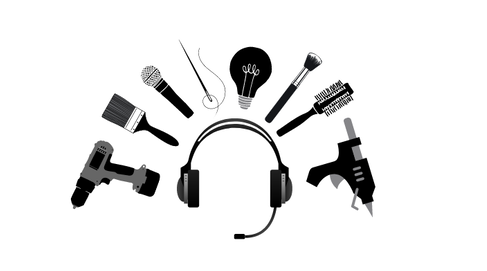BEING A TECHIE AT A READING, BY SAM LANDGRAF
This past weekend, Seat of the Pants had our first Salon Series reading of our 2025/2026 season with India Nicole Burton’s The Witching Hour. If you were able to come see it, you know that it was an amazing full- length play that is the last part of a trilogy of plays by India. The goal of these Salon Series readings is to allow playwrights to hear their plays out loud, for the first time, and to get immediate feedback from and dialogue with an audience. It’s an awesome tool for playwrights to focus their work and to clear up anything that may confuse the audience. Readings tend to bring out voracious readers of plays or books, other playwrights, and avid theatre goers or performers. As a technical theatre person who is not a wordsmith, or a huge reader, and most definitely not a performer, I am not the typical audience member and I don’t hear or see the play in the same way.
At the end of act one, I thought to myself, “Damn, I really want to design lights and projections for this show!” There is a character in The Witching Hour that has the gift of being able to control the weather, and she creates thunder and lightning and rain - lots of rain. As this is being described in the reading, I am imagining what it could look like on the stage and then thinking about how you could achieve that with the restrictions of a theatre space. Lightning can be achieved by a combination of projections and lights. Using video of lightning bolts behind the action and flashing of the lights in front of the action could create a really cool effect. Thunder is a sound effect, but would adding a stagehand in the wings with a sheet of metal make the effect better? Now rain, that’s a hard one. It could be achieved by sound effects, but watching a character get soaked by the rain that she created would be super cool. Real rain could only be created in a very specific theatre space, and as the imagination designer, I think I would have to insist that we find a space that would allow us to have rain.
But now, my stage manager voice starts to kick in. “How in the world are we going to get an actor soaking wet in one scene and have them completely dry two minutes later?!” The costume designer voice agrees with the stage manager voice. The technical director voice is already coming up with a rig to make it rain and working out how it can somehow be able to recycle the water that has fallen to the stage and get it back up to the rig so it can rain again. The carpenter voice wants to know how to make plywood waterproof and the light and sound crew voice is trying to figure out how not to electrocute everyone in the theatre. The stage crew voice is just thinking about all the mopping that is going to have to be done every night. And the producer's voice is thinking, “Rain?! In a theatre?! That's gonna cost a lot.”
And then the theatre lover snaps us all back to reality and reminds us all to shut up and pay attention to the beautiful art that is being created in front of us with just spoken words from a page created by a very talented playwright.


